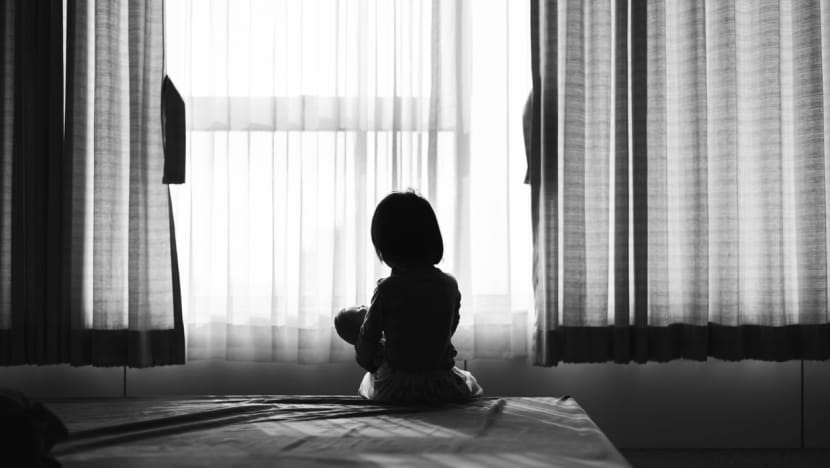Commentary: Family members who keep quiet about child sexual abuse are just as guilty
The home is where our kids should feel safest; family members are meant to be protectors, not sexual predators and silent bystanders, says TSMP Law Corporation’s Stefanie Yuen Thio.

File photo. There was a 61 per cent increase in the number of reports of sex crimes by family members against minors between 2019 and 2021. (Photo: iStock)

This audio is generated by an AI tool.
SINGAPORE: Over a period of three years, a 47-year-old man forced his lover's children, aged eight and nine, to watch pornography and reenact the scenes while he filmed them. He was a diagnosed paedophile and father of three who had done jail time for molesting his four-year-old daughter just two years prior. For his new crimes, he was sentenced to 24 years in jail and given 24 strokes of the cane in 2020.
In 2019, a convicted rapist sexually violated his 16-year-old granddaughter. He had also asked the victim's younger sister to have sex with him. Twenty years ago, the same man had been convicted of rape, molestation and carnal intercourse against his daughter and four of her friends, then between 13 and 17. He had already served his jail term of 12 years and received 12 strokes.
When his wife discovered his actions against their granddaughter, she made him promise not to do it again, but did not report his crimes. News reports do not suggest that she tried to separate him from the victims.
And in October, a 62-year-old taxi driver was jailed for 21-and-a-half years for sexually abusing his teenage daughter over three years. The man told his daughter he “was teaching her how to protect herself” as he performed these acts on her. The girl later attempted suicide twice.
Intra-familial sexual assault against children. Even seeing the words together on a screen turns the stomach. The home is where our kids should feel safest; family members are meant to be protectors, not predators.
DOES SINGAPORE NEED HARSHER LAWS?
There has been an increase in the number of reports of sex crimes by family members against minors – up 61 per cent from 2019 to 2021. The Child Protective Service (CPS) investigated 443 cases of purported sexual abuse in 2021, constituting 21 per cent of the 2,141 cases CPS investigated that year.
The egregious assaults prompted former President Halimah Yacob in December 2022 to call for a review of penal laws. Others have asked if a sex offenders' registry would reduce the crimes.
Reading news reports of such unthinkable abuse, it is natural to get angry and to call for harsher laws. Even one such act against a defenceless child is a crime too many. The issue of what to do about it is more complex, however.
Singapore's penalties for physical sexual offences against children are already among the most severe our laws mete out.
It is illegal to have sex with children under the age of 16, regardless of consent. If the minor is below 14, perpetrators face up to 20 years’ jail, a fine and caning.
If the offender hurts or verbally threatens the victim to commit rape or sexual assault, there is a mandatory minimum of eight years’ jail and 12 strokes caning. Apart from life imprisonment, a 20-year term is the lengthiest imprisonment term prescribed in the Penal Code.
The government continues to enhance the protection of minors, and in 2019 increased penalties for offences against children under 14 years of age, where offenders may be punished with up to twice the maximum punishment. New offences were introduced to criminalise the entire spectrum of activities involving child abuse material. But even without these enhancements, the penalties were already stiff, but did not deter these predators.
PLACE PRESSURE ON BYSTANDERS TO SPEAK OUT
Reading the news reports mentioned above, I wonder whether the family members could and should have done more, such as reporting suspected abuse, applying for protective orders, and getting government agencies to step in.
While it is understandable to not want to damage the family unit, especially if the perpetrator is the sole breadwinner, it is important that family members act swiftly when they have reason to believe that children are in danger.
Take the case of the taxi driver. He had sexually groomed his daughter by making her watch pornography when she was 12 or 13, and later sexually assaulted her. It was reported that the girl told her mother about the incidents after calling a rape hotline, but it wasn’t until years later in 2022 that the mother disclosed the matter to a friend, who reported it to authorities.
Under the Children and Young Persons Act 1993, it is an offence for anyone with “custody, charge or care of a child or young person” to “knowingly permit” them to be abused. These laws were further strengthened against such bystanders in 2019.
Laws like these should be actively enforced, with significant sentences that will not just bring the adult bystander to justice, but also signal that, as a community, Singapore will hold these adults accountable. You don't have to be the sexual predator to have committed a crime.
We must also continue to raise awareness.
In some cases, the victims only reported the abuse after they learned, through public education, that crimes had been committed.
Kudos to the education system and agencies that provide such training, but we need to also inform the public at large - specifically guardians of children - of their duties, the penal consequences that would follow a failure to fulfil them, and the help available.
WHAT ABOUT A PUBLIC SEX OFFENDER REGISTRY?
Next, should sex offenders be allowed back into environments with vulnerable minors, even after they have served the prison sentences?
In the two cases mentioned at the start of this piece, the first offender was a diagnosed paedophile. The second, having raped his daughter and her friends, later lived with his granddaughters - young girls who would similarly fall victim to his abuse.
I am glad the government is currently considering amending the law to allow for detention of dangerous offenders for as long as is needed for public safety, but I don't envy the professionals and persons in authority who would have to make such tough judgment calls.
Public sex offender registries have also been mooted. This is a registry recording the identities of convicted sex offenders which is available to the public.
It is important to note that not all convicts are at risk of re-offending, and we must balance justice – the offender would have completed the jail term – against public protection.
In the US, the only country which has a public sex offender registry, 44 per cent of surveyed family members of registered sex offenders reported having been threatened and harassed, with 7 per cent being targets of assault.
It is natural, in the face of such heinous crimes, to want to throw a bigger statute book or thicker rotan at the perpetrator. But clearly, after-the-fact punishments are not a sufficient deterrent. Even raising the maximum age for caning may not be enough as so many abusers are below 50.
Our interventions need to focus on prevention and speedier reporting. Failing which, the numerous channels of protective assistance provided by government agencies will be akin to post-abuse support. We would be applying a small plaster to the gaping wound of a lifetime of psychological trauma to come.
There is no crime as sickening as one against a child. And no one so culpable as an adult who should be protecting that child. While enhancements to laws are important, awareness and quick action by bystander family members and friends are critical. That will take courage, because of potential consequences to the family unit, but it is a courage we cannot fail to exercise.
Stefanie Yuen Thio is Joint Managing Partner at TSMP Law Corporation.




















